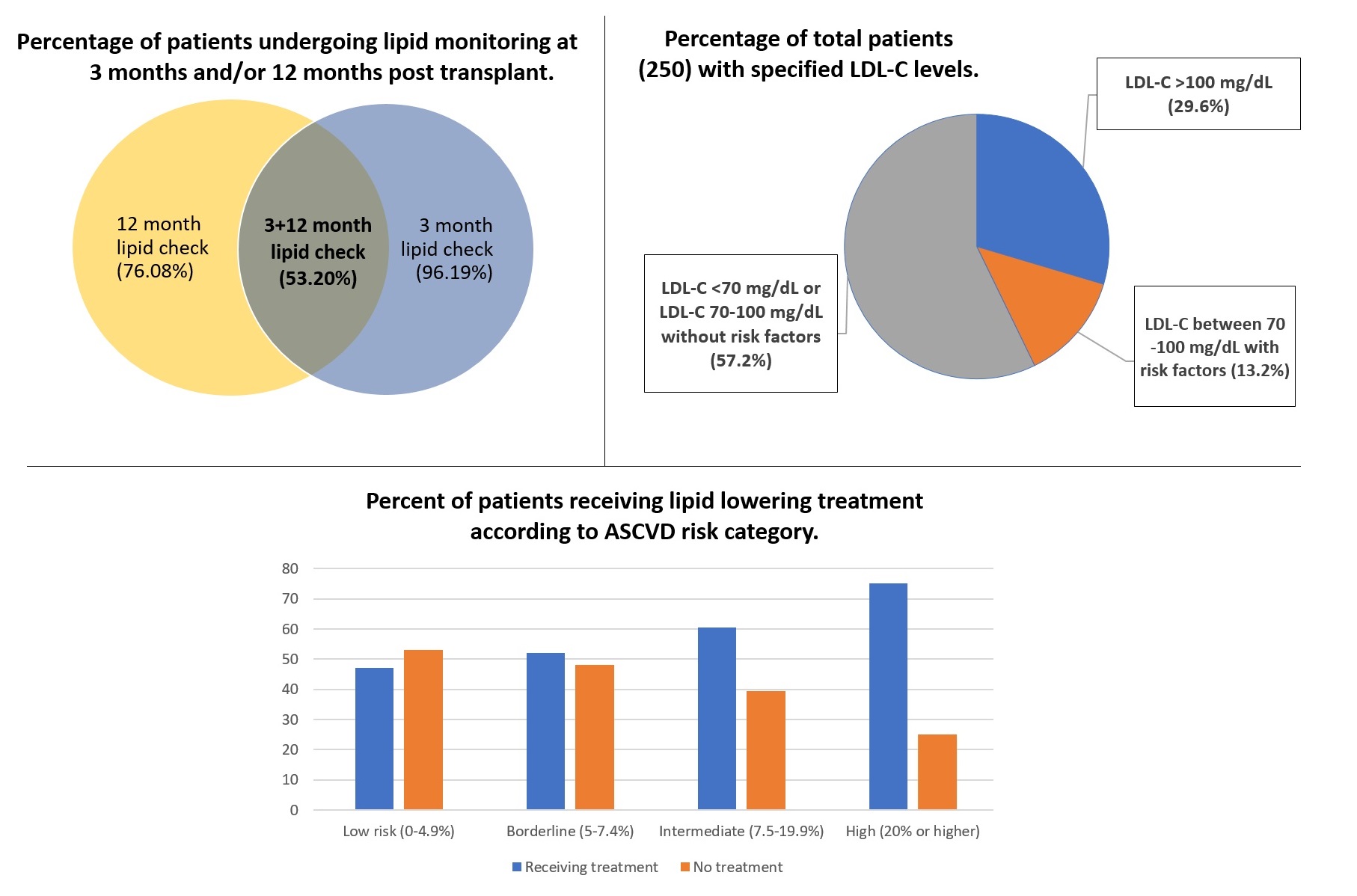A Single-Center Cross-Sectional Analysis of Lipid Management in Kidney Transplant Recipients: Is It Time to Reassess KDIGO Guidelines?
1Renal Division, Brigham and Women's Hospital, Boston, MA, 2Brigham and Women's Hospital, Boston, MA
Meeting: 2022 American Transplant Congress
Abstract number: 603
Keywords: Dyslipidemia, Kidney transplantation, Lipids
Topic: Administrative » Administrative » 01 - Quality Assurance Process Improvement & Regulatory Issues
Session Information
Session Name: Quality Assurance Process Improvement & Regulatory Issues
Session Type: Poster Abstract
Date: Saturday, June 4, 2022
Session Time: 5:30pm-7:00pm
 Presentation Time: 5:30pm-7:00pm
Presentation Time: 5:30pm-7:00pm
Location: Hynes Halls C & D
*Purpose: Cardiovascular disease remains the leading cause of mortality after kidney transplant, accounting for more than 30% of total deaths. Dyslipidemia is common following transplantation, and according to the 2013 KDIGO guidelines, statins are recommended in all kidney transplant recipients (KTRs). However, there is no recommendation for specific dose adjustments or routine lipid monitoring. This can lead to untreated or undertreated lipids in KTRs, placing them at a risk for adverse cardiovascular events. Given the potential for disparity and inconsistency, we wanted to analyze the current status of lipid control at our institution.
*Methods: We conducted a single-center, cross sectional analysis of 250 KTRs who were transplanted in the last 4 years. Data that was analyzed included frequency of lipid monitoring (our institutional policy is to check at 3 and 12 months post-transplant), cholesterol levels, cardiovascular risk factors, ASCVD scores, frequency of statin use, statin intolerance, immunosuppressive regimens, etc.
*Results: We found that about 96% KTRs had lipids checked at 3 months, 76% of KTRs had lipids checked at 12 months, 53.2% of KTRs had lipid checked at both 3 months and 12 months. About 30% of KTRs had LDL-C levels>100 mg/dL, 13% had LDL-C levels between 70-100 mg/dL with one of the cardiovascular risk factors. 89.5% of KTRs assessed had at least 1 risk factor (diabetes, hypertension, coronary artery disease and smoking). 54.7% of KTRs that warranted lipid lowering therapy were receiving some form of treatment. Of the total number of KTRs on statins, 10.6% of KTRs reported intolerance (myalgia, hepatotoxicity).
*Conclusions: Our institutional analysis showed sub-optimal lipid control in KTRs, which could be attributed to a lack of clear guidelines on lipid management in KTRs. This is likely due to inadequate studies and weak evidence around the effects of lipid control in KTRs. Based on a survey we conducted across multiple transplant institutions in the Unites States (separate abstract), we found that there are institution-level disparities in the frequency of lipid monitoring and target cholesterol levels for treatment. Since cardiovascular disease remains the leading cause of death in KTRs, optimal lipid control is of utmost importance. For this, we need better and more uniform guidelines for lipid control strategy, which can only be achieved by long term studies assessing benefits on allograft survival and overall outcomes in KTRs.
To cite this abstract in AMA style:
Saranu R, Pandav J, Balusu M, Azzi J, Yeung MY, McGrath M, Abdel-Basset E, Gabardi S, Chandraker A. A Single-Center Cross-Sectional Analysis of Lipid Management in Kidney Transplant Recipients: Is It Time to Reassess KDIGO Guidelines? [abstract]. Am J Transplant. 2022; 22 (suppl 3). https://atcmeetingabstracts.com/abstract/a-single-center-cross-sectional-analysis-of-lipid-management-in-kidney-transplant-recipients-is-it-time-to-reassess-kdigo-guidelines/. Accessed February 16, 2026.« Back to 2022 American Transplant Congress

